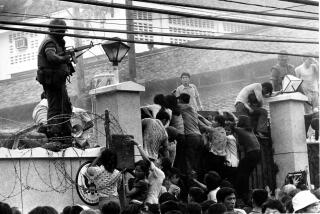Little Saigon Reacts With Sadness to McNamara’s Book : History: The ex-official’s writings remind many Vietnamese emigres of their losses and how they and their American allies fought for very different reasons.
- Share via
SANTA ANA — The Little Saigon Radio talk show on former Secretary of Defense Robert S. McNamara’s controversial new memoir had ended an hour ago. Still, the phones continued to ring.
If America’s involvement in the war was indeed “wrong, terribly wrong,” as McNamara put it, did that mean the Vietnamese also made a mistake, one caller asked. Did the millions of Vietnamese who fought or fled their homeland do it for nothing, another demanded.
Here in the world’s largest community of expatriate Vietnamese, McNamara’s mea culpa , “In Retrospect: The Tragedy and Lessons of Vietnam” is reverberating as it has across America. But as the 20th anniversary of the fall of Saigon approaches, there has been little of the heated debate, impassioned rhetoric and loud protest so common here to controversies over the war.
As the book climbs toward the top of the New York Times Bestseller list, there is only quiet disappointment, calm resignation and sad reproach.
“For everyone who was involved in the war, it cost us everything that meant anything,” said Mai Cong, president and executive officer of Vietnamese Community of Orange County, a social services organization based in Santa Ana. “Here he comes out, saying he made a mistake. I wonder if he realizes how much his announcement has increased the emotional suffering of the people.”
Tony Lam, a Westminster City Councilman, praised McNamara’s “courage for talking about it now.”
But, “it comes thousands-of-lives-lost too late,” Lam said. “And we Vietnamese are disappointed with what he has written, because it makes it look (as if) we didn’t have the right cause in the war. That’s not true. We were fighting against (communist) aggression in our country. And for him to say what he did only belittles our efforts.”
The book also reminds emigres that, although the Republic of Vietnam and its American ally fought a common enemy, they fought for very different reasons. The United States sent advisers and, subsequently, troops to Vietnam to stem what its leaders believed would be the expansion of communism throughout Southeast Asia.
The South Vietnamese fought for democracy and personal freedom, expatriates said.
Phong Tran, one of the radio talk show’s guest commentators, and others said they understand that fundamental difference is what made the war “wrong” for people such as McNamara. But sadly, they added, it also serves as a permanent reminder of the political chasm between many Vietnamese Americans and those who did not support the war.
During Little Saigon Radio’s weekly talk show “Nhung Van De Cua Chung Ta” (“Our Issues”) on Monday, most callers were insulted by McNamara’s conclusion that the war was a mistake, Tran said.
“But they were not angry or hostile,” he said. “They knew he didn’t understand the pain of the people of Vietnam.”
Dai Pham, who was imprisoned in a re-education camp for 17 years because he worked for the U.S. Embassy in Saigon, believes “In Retrospect” merely reflects a sign of the times.
McNamara’s book will help Vietnam and the United States continue their work toward diplomatic relations, predicted Pham, a counselor with the Vietnamese Community of Orange County.
But what is unforgivable, he said, is that McNamara “discounted the lives that had been sacrificed.”
“More than 50,000 American soldiers died and more than 500,000 Vietnamese died,” said Pham, 50. “The (former) secretary of defense just announced that they died for nothing.”
Co Pham, president of the Orange County Vietnamese Chamber of Commerce, and an advocate of a better relationship with Vietnam, said McNamara’s book will prove educational for Vietnamese Americans and the general public.
“We should use McNamara’s work to look at the past and learn from it to build a better future,” Pham said. “If we would only admit to ourselves that our leaders were corrupt, that they did not provide the leadership we needed to win, that they didn’t entirely believe in the cause of South Vietnam, then we would be on our way to healing.”
More to Read
Sign up for our Book Club newsletter
Get the latest news, events and more from the Los Angeles Times Book Club, and help us get L.A. reading and talking.
You may occasionally receive promotional content from the Los Angeles Times.









